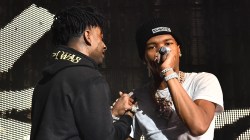The going rate for a legal download on Apple’s iTunes is $1.29, but the language of current copyright law allows music publishers to sue people who illegally download material via file-sharing sites for statutory damages ranging from $750 to $150,000 per song. When Jammie Thomas-Rasset heads back to court on November 2, a legal precedent may be set on just how much copyrighted works illegally downloaded over peer-to-peer networks are worth.
“I don’t know that you need an expert for the common-sense proposition that songs are $1 on the Internet,” said Thomas-Rasset’s attorney, Joe Sibley, in an interview with Billboard magazine.
Thomas-Rasset was originally charged in 2007 in the first individual peer-to-peer case to ever reach a jury. Thomas was charged with $222,000 worth of statutory damages, but the case was later thrown out on the grounds that having 24 songs in her “shared folder” did not qualify as illegal distribution of copyrighted material. The case went to trial again in 2009, and a second jury charged Thomas-Rasset with statutory damages of $80,000 per song. A second judge voided the 2009 ruling, and when labels rejected a reduced award of $2,250 per song, the trial was rescheduled for a third time.
In the meantime, the recording industry has lobbied for the passage of Senate Bill S. 3804. The Combating Online Infringement and Counterfeits Act seeks to stop the ability of Web sites and blogs to freely offers what it refers to music in a “complete or substantially complete form, by any means, including by means of download, transmission, or otherwise…”

AD LOADING...
In September, Universal Music’s Jim Urie circulated an e-mail asking for support of the bill. Various publicists and managers under the Universal umbrella continue to directly e-mail mp3 files and links that fall under the above description laid out by Bill S. 3804 in hopes of securing free promotion for their artists. Meanwhile, Thomas-Rassset’s third trial for sharing 24 songs will begin in federal court in Minneapolis, Minnesota on November 2.



